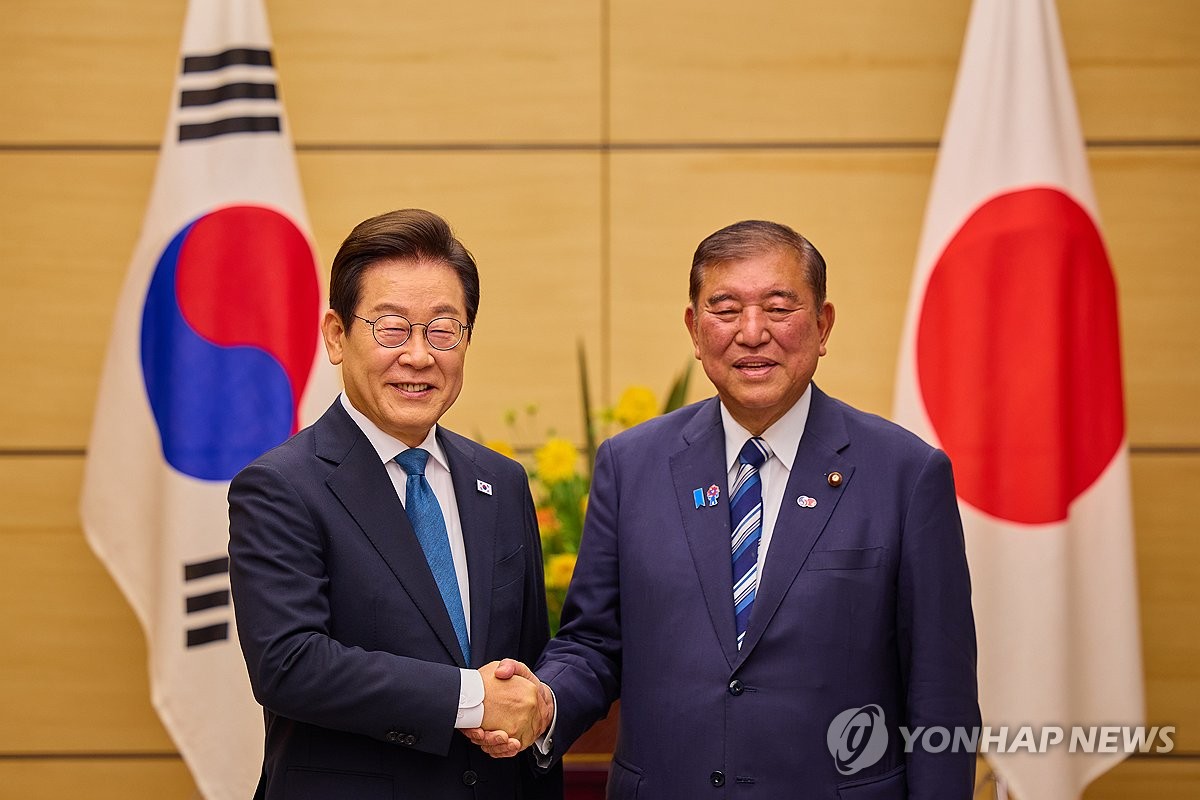(News Focus) Lee, Ishiba agree to bolster bilateral ties, 3-way cooperation with U.S.

TOKYO, Aug. 24 (Yonhap) -- The summit between President Lee Jae Myung and Japanese Prime Minister Shigeru Ishiba focused on deepening bilateral ties and enhancing trilateral coordination with the United States, ahead of Lee's crucial summit talks with U.S. President Donald Trump.
Lee chose Japan as his first destination for a bilateral summit since taking office in June, a rare itinerary for a South Korean president, as they traditionally visit Washington, Seoul's key ally, first.
His Tokyo stop underscored what he called a "pragmatic" foreign policy, as rising uncertainty in the security alliance and trade ties with the U.S. has added urgency to closer alignment between the two Asian neighbors, both major economic powers and U.S. treaty allies.
In their second meeting -- following an encounter on the sidelines of the Group of Seven summit in Canada -- Lee and Ishiba built personal rapport and released the first joint statement from a Seoul-Tokyo summit in 17 years.
"The two leaders agreed it is more important than ever to pursue unwavering bilateral relations and South Korea-U.S.-Japan cooperation in a rapidly changing international environment," the statement said. "They also agreed to work to create a virtuous cycle in which progress in bilateral relations leads to stronger trilateral coordination."
National Security Adviser Wi Sung-lac said that closer ties between Seoul and Tokyo have been one of Washington's priorities in its foreign policy in the Indo-Pacific and would positively impact trilateral cooperation.
"It is positive that the two countries, despite many pending issues stemming from the past, are moving toward good cooperation," Wi told reporters Sunday.
As major exporters to the U.S., both Seoul and Tokyo share critical economic interests but face growing pressure from Washington to boost defense spending and contribute more to the cost of stationing American troops. Their auto and semiconductor industries also remain vulnerable to U.S. tariff hikes.
Lee described his visit to Tokyo as an opportunity to solidify the foundation for "future-oriented" ties as this year marks the 60th anniversary of the normalization of the countries' diplomatic relations.
Emphasizing the importance of closer exchanges, the leaders agreed to hold regular meetings through "shuttle diplomacy," with Ishiba expected to visit South Korea for the Asia-Pacific Economic Cooperation summit in Gyeongju in late October.
With cooperation high on the agenda, the two leaders touched on historical issues but avoided delving into sensitive matters, such as wartime forced labor and former sex slaves, euphemistically called "comfort women."
While acknowledging that relations have often been strained by historical disputes, Lee has said that his administration would not backtrack on the past agreements on forced labor and comfort women, though many Koreans continue to harbor resentment.
In an interview with Japan's Yomiuri Shimbun published Thursday, Lee said he seeks to expand cooperation with Tokyo under the principle of "stepping forward into the future while squarely facing the past."
Ishiba, for his part, pledged to uphold previous administrations' historical positions, citing a 1998 declaration adopted by then South Korean President Kim Dae-jung and Japanese Prime Minister Keizo Obuchi.
Earlier this month, he expressed "remorse" for Japan's wartime past during the National Memorial Ceremony for the War Dead -- the first such remark by a Japanese leader since 2013 -- though he stopped short of the explicit "apology" contained in the declaration.
Other contentious issues, such as South Korea's ban on seafood imports from eight Japanese prefectures near Fukushima imposed after the 2011 nuclear disaster, were not formally on the agenda, though briefly mentioned during the summit, Wi said. Tokyo has repeatedly pressed Seoul to lift the restrictions.
In his interview, Lee said it is important to first restore the Korean public's trust in Japanese seafood.
ejkim@yna.co.kr
(END)





